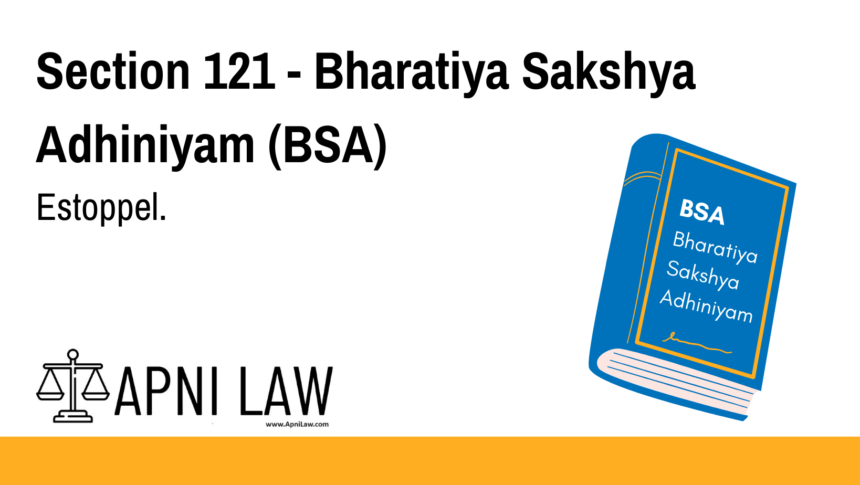Code: Section 121 – Bharatiya Sakshya Adhiniyam (BSA)
When one person has, by his declaration, act or omission, intentionally caused
or permitted another person to believe a thing to be true and to act upon such belief, neither
he nor his representative shall be allowed, in any suit or proceeding between himself and
such person or his representative, to deny the truth of that thing.
Illustration.
A intentionally and falsely leads B to believe that certain land belongs to A, and
thereby induces B to buy and pay for it. The land afterwards becomes the property of A,
and A seeks to set aside the sale on the ground that, at the time of the sale, he had no title.
He must not be allowed to prove his want of title.
Explanation of Section 121 – Bharatiya Sakshya Adhiniyam (BSA)
Section 121 of the Bharatiya Sakshya Adhiniyam deals with the legal principle of estoppel. It bars a person from denying a statement or conduct they previously asserted or allowed another person to rely on, especially when the other party has taken action based on that belief.
In simpler terms, if someone misleads another person—intentionally or by omission—into believing something to be true, and that other person acts on that belief, the person who misled them cannot later deny what was earlier represented.
This provision promotes fairness and consistency in legal proceedings by holding individuals accountable for their previous representations and preventing deceit.
Key Principles:
- A person is prevented from denying something if they previously led another to believe it and the other person acted upon it.
- Estoppel applies only when the belief was caused by an intentional declaration, act, or omission.
- This principle ensures that parties act honestly and fairly in their interactions.
Illustration
Example: False Ownership Claim
A falsely claims that he owns a piece of land and convinces B to purchase it. Later, when A actually acquires the land, he tries to invalidate the earlier sale by saying he didn’t own the land at the time of the sale. Under Section 121, A is estopped (legally barred) from making that claim.
Common Questions and Answers on Section 121 – Bharatiya Sakshya Adhiniyam (BSA)
1. What is the meaning of estoppel?
Estoppel is a legal doctrine that prevents a person from asserting something contrary to what they previously stated or implied, especially if someone else relied on that representation to their disadvantage.
2. When does estoppel apply under this section?
Estoppel under Section 121 applies when:
- A person makes a declaration, act, or omission;
- That declaration induces another person to believe something to be true;
- The other person acts upon that belief; and
- The first person later tries to deny the truth of that belief.
3. Is estoppel limited to civil cases?
No. While estoppel is most commonly used in civil proceedings, it may apply in other legal proceedings where the necessary conditions are met.
4. Can estoppel be claimed against a third party?
No. Section 121 applies only between the person making the representation and the person acting upon it (or their respective legal representatives). It does not apply against unrelated third parties.
5. Is intent necessary to apply estoppel?
Yes. The misrepresentation must be intentional—whether by direct statement, misleading conduct, or omission—with the knowledge that the other party might rely on it.
Conclusion
Section 121 of the Bharatiya Sakshya Adhiniyam codifies the rule of estoppel, which is a fundamental principle of fairness and justice in legal proceedings. It ensures that individuals cannot mislead others and later go back on their word or conduct when it suits them. The provision promotes consistency, trust, and integrity in both personal and commercial dealings.
For more insightful legal explanations and updates on the latest Indian laws, visit ApniLaw.








